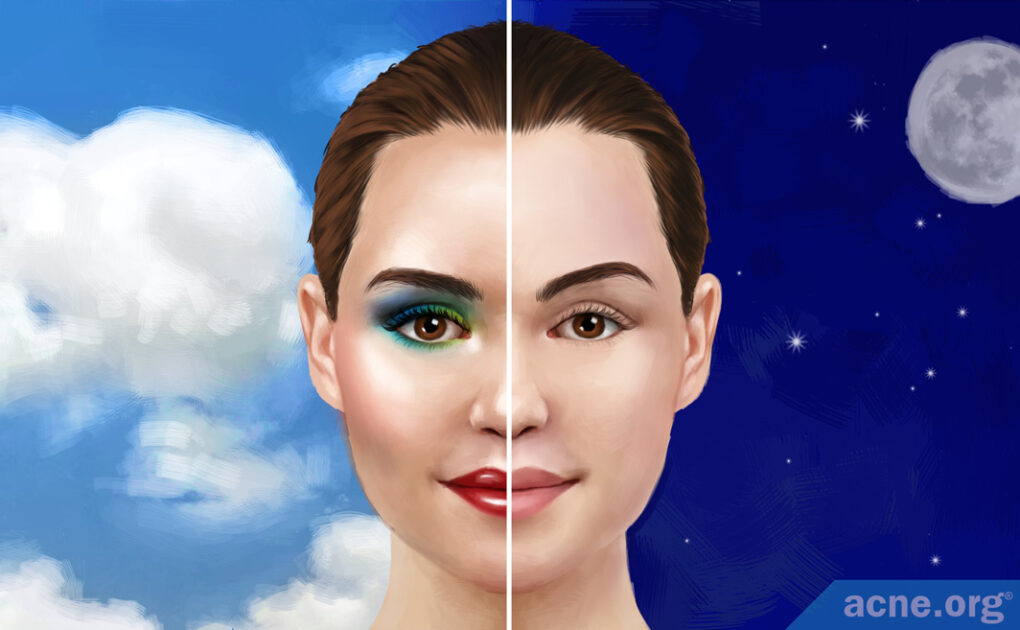At Night, the Skin Is More Vulnerable to Substances Left on the Skin Surface

The Essential Info
At night, the skin becomes more porous. This makes it more likely that ingredients in makeup, or pollutants trapped in makeup, might penetrate the skin. This is especially true for acne-prone skin, which is already more porous than healthy skin. It is therefore good practice to remove makeup with gentle makeup removers before bed.
Hard Science is Lacking: There are no direct studies on how leaving makeup on the skin affects acne, but until we have that, it is safest to remove makeup before bed.

The Science
Healthy skin is our first line of defense against many harmful substances that our bodies come in contact with, such as pollutants and bacteria. This is why the outer layer of our skin is known as the skin barrier. The skin barrier is like our outer “armor,” protecting our bodies from physical damage, from chemicals in our environment, and from bacteria and viruses.1

According to an article published in 2016 in the journal Life Sciences, “[The] skin is the largest organ in body, and acts as the first and most important defense barrier against environmental contaminants. Skin is always exposed to the contaminants, and various…chemicals can be absorbed into the skin.”1
Unfortunately, the skin barrier is not always in excellent working order. Acne-prone people tend to have a weakened skin barrier. This makes their skin more vulnerable to substances left on the skin surface, which can seep in and cause irritation. Since we know that irritation can make acne worse, acne-prone people need to be especially careful about what substances come into contact with their skin.
The Skin Barrier Is Weaker at Night
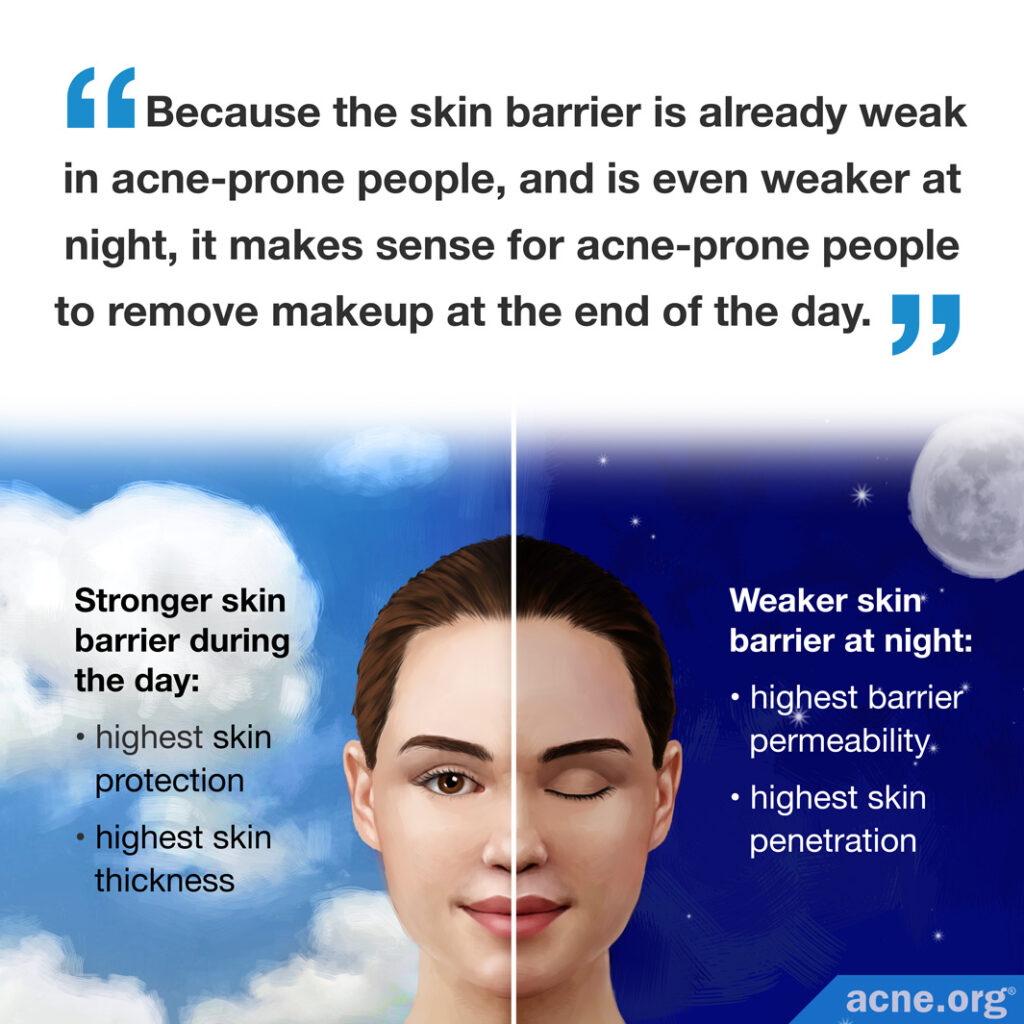
The skin barrier is particularly weak at night, even in people who are not prone to acne. During the night, our skin lets its guard down as it focuses on repairing itself and making new skin cells.2,3 When it comes to our skin, night is a time for repair, but not for defense. Because the skin barrier becomes weakest at night, the skin becomes more vulnerable.
Because the skin barrier is already weak in acne-prone people, and is even weaker at night, it makes sense for acne-prone people to remove makeup at the end of the day. This prevents any ingredients in makeup and any substances that might be trapped in the makeup, such as pollutants, from seeping in to the skin during the night and possibly causing irritation.
How to Remove Makeup at the End of the Day
Many makeup products are not water-soluble. In other words, they do not wash off easily with just water. This is why you will need to use a gentle cleanser in order to remove makeup at night.4 Remember to use a light touch to avoid irritating your skin.
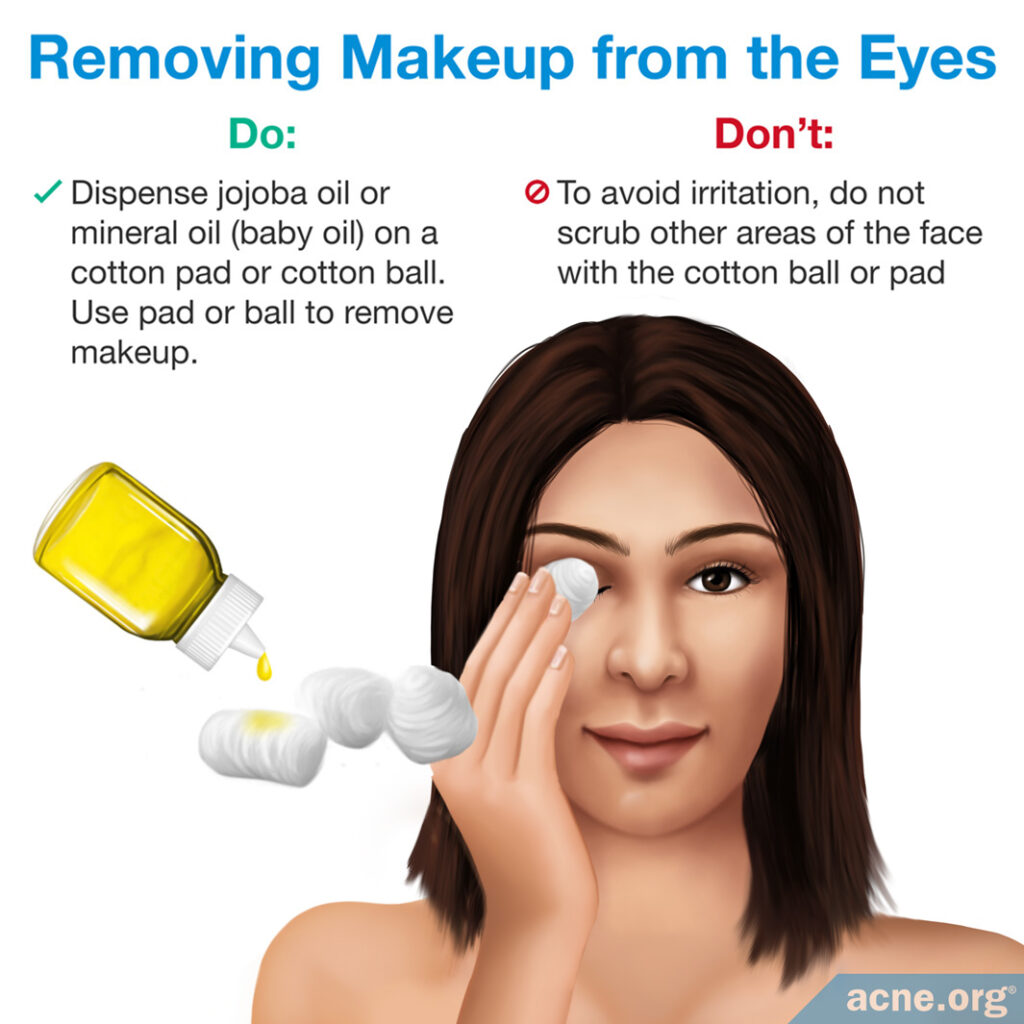
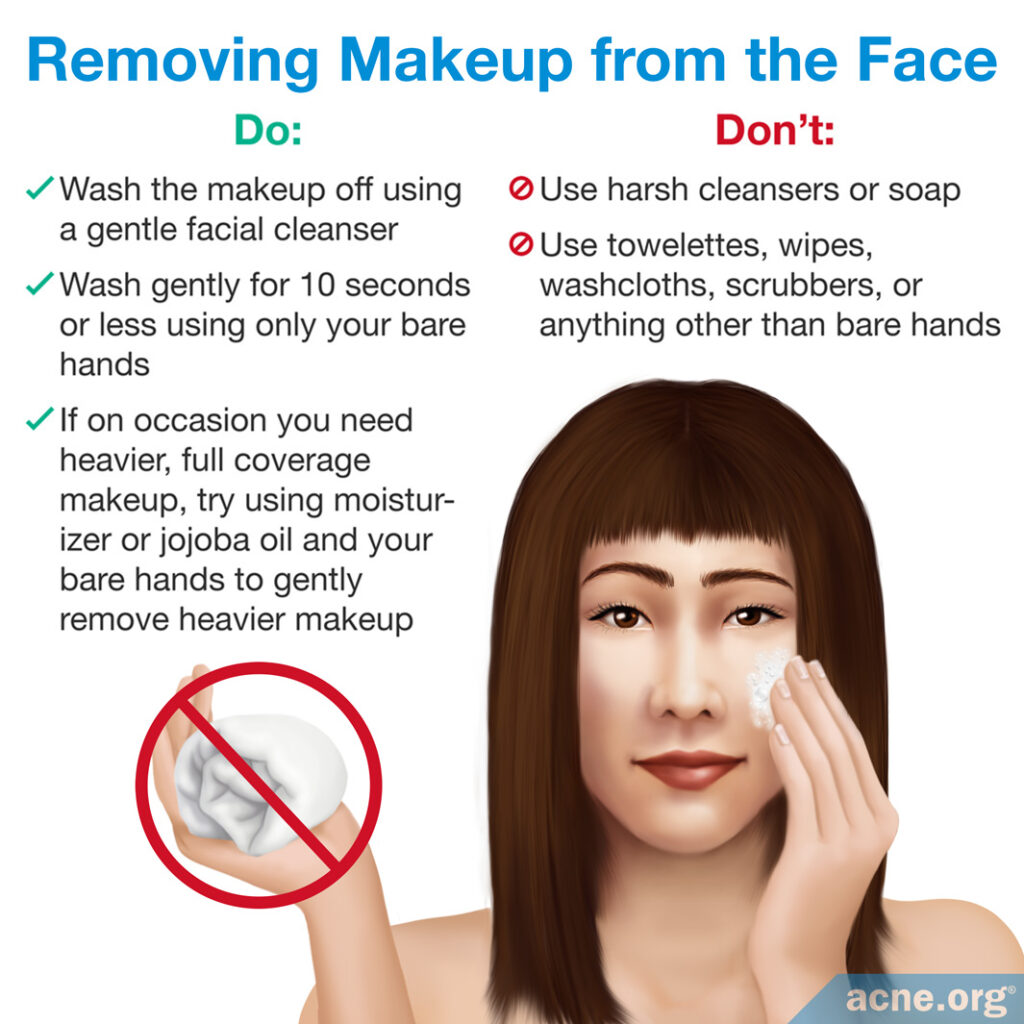
Studies
Unfortunately, no research studies have looked at the consequences of not removing makeup at the end of the day, but we do know that some cosmetic products play a role in acne development5, so it makes common sense to err on the side of caution and remove any makeup at night.
In addition, scientists have looked at how other substances can penetrate the skin and cause irritation. From these studies, we have some indirect evidence that leaving substances like makeup on the skin at night might also cause irritation and possibly make acne worse.
Substances that come in contact with the skin may make acne worse
Several studies have looked at how pollutants (chemicals or particles of dirt in the air, like smog or tobacco smoke) can cause skin problems:
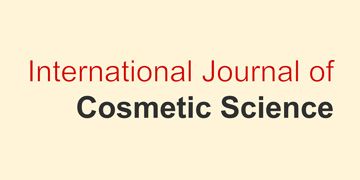
Research published in the International Journal of Cosmetic Science in 2015 and conducted in Shanghai and Mexico City, which are both highly polluted, found that:
- People’s skin in highly polluted cities produces more sebum (skin oil). Increased sebum production is one of the first steps in the development of acne. In other words, this finding provides indirect evidence that when pollution comes in contact with the skin, the skin may be more likely to develop acne.6
- The skin oil in people in highly polluted cities contains less of a substance called squalene. Squalene is a normal part of skin oil, and having less of this substance is an indirect sign that the skin may be in the early stages of developing acne.6
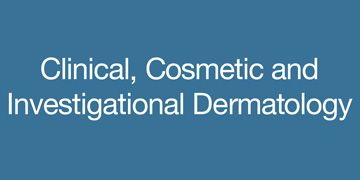
Recent studies conducted in Asia found that exposure to air pollutants may worsen the symptoms of acne. They also found that some pollutants are worse than others. For instance, nitrogen dioxide seems to be worse for acne-prone skin than ozone, but more research is necessary to support these results.6

An article published in 2017 in the journal Clinical, Cosmetic and Investigational Dermatology summarized the results of these studies as follows: “Together, these…studies indicate that exposure to air pollutants may aggravate acne vulgaris.”6
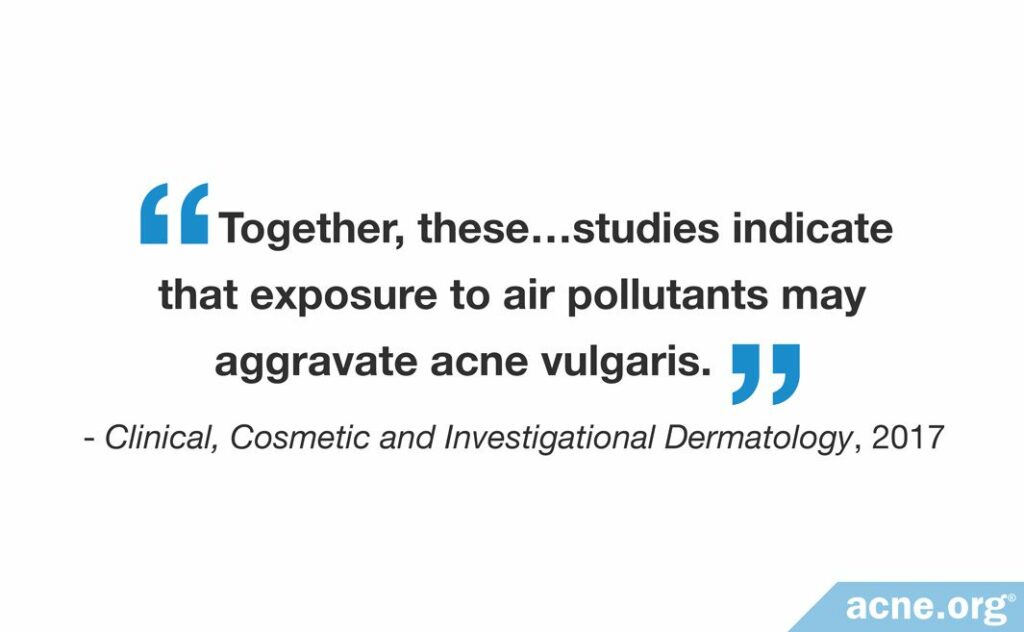
Of course, makeup is not a pollutant. However, these studies provide indirect evidence that substances that come in contact with the skin may potentially contribute to acne. In other words, it is probably a good idea to err on the side of caution and remove any makeup from the skin at the end of the day.
Washing the skin twice a day may improve acne
Regardless of makeup, if you are prone to acne, it is good practice to wash your face at the end of the day.
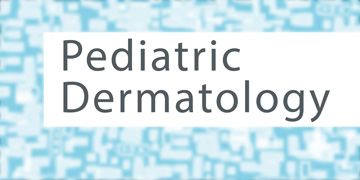
One study, which was published in 2006 in the journal Pediatric Dermatology, sheds light on how often a person with acne should wash their skin with cleanser. The study looked at 24 patients, who were divided into three groups. Group 1 washed their faces only once a day, Group 2 washed their faces twice a day, while Group 3 washed their faces four times a day. At the end of the study, which lasted eight weeks, Group 2 experienced slight improvements in their acne. However, it is important to note that these results were not statistically significant: in other words, the differences between the three groups were too small for the researchers to draw any firm conclusions.7 Moreover, this study was relatively small and needs to be repeated with more participants.
Still, the results of this study suggest that it may be good practice to wash the face twice a day. One of these times should be before bed, using a gentle cleanser to remove any makeup. This will prevent the makeup from penetrating the skin and causing irritation, which might potentially make acne worse.
References
- Kim, K.E., Cho, D., & Park, H.J. (2016). Air pollution and skin diseases: Adverse effects of airborne particulate matter on various skin diseases. Life Sciences, 152, 126-34. https://www.ncbi.nlm.nih.gov/pubmed/27018067
- Matsui, M.S., Pelle, E., Dong, K., & Pernodet, N. (2016). Biological rhythms in the skin. International Journal of Molecular Sciences, 24, 17(6). https://www.ncbi.nlm.nih.gov/pmc/articles/PMC4926335/
- Dong, K., Goyarts, E., Rella, A., Pelle, E., Wong, Y. H. & Pernodet, N. Age associated decrease of MT-1 melatonin receptor in human dermal skin fibroblasts impairs protection against UV-induced DNA damage. International Journal of Molecular Sciences 21, 326 (2020). https://pubmed.ncbi.nlm.nih.gov/31947744/
- Mukhopadhyay P. Cleansers and their role in various dermatological disorders. (2011). Indian Journal of Dermatology, 56, 2-6. https://www.ncbi.nlm.nih.gov/pubmed/21572782
- Dréno, B. What is new in the pathophysiology of acne, an overview. Journal of the European Academy of Dermatology and Venereology: JEADV 31: 8-12 (2017). https://pubmed.ncbi.nlm.nih.gov/28805938/
- Krutmann, J., Moyal, D., Liu, W., Kandahari, S., Lee, G.S., Nopadon, N., Xiang, L.F., & Seité, S. (2017). Pollution and acne: is there a link? Clinical, Cosmetic and Investigational Dermatology, 10, 199-204. https://www.ncbi.nlm.nih.gov/pmc/articles/PMC5446966/
- Choi, J. M., Lew, V. K., & Kimball, A. B. (2006). A single-blinded, randomized, controlled clinical trial evaluating the effect of face washing on acne vulgaris, Pediatric Dermatology, 23, 421 – 427. https://www.ncbi.nlm.nih.gov/pubmed/17014635
 Acne.org Products
Acne.org Products